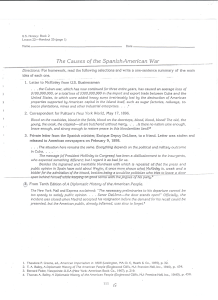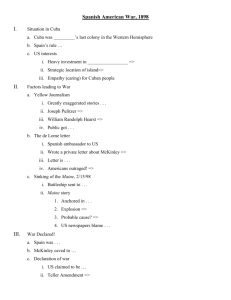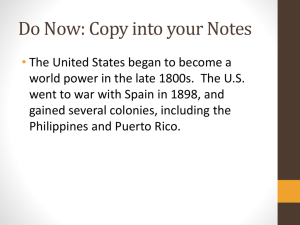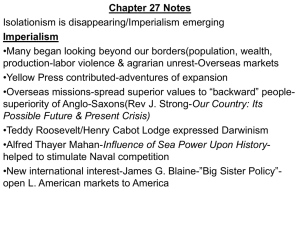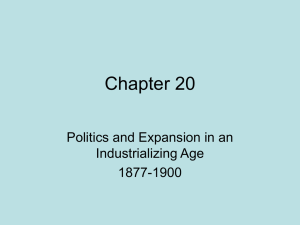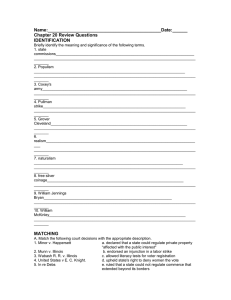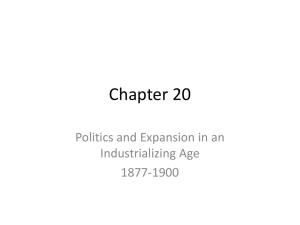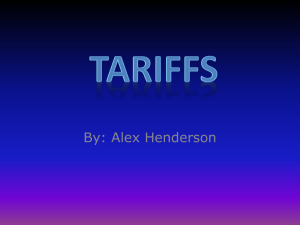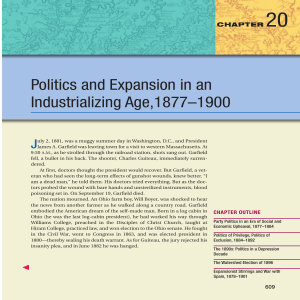Chapter 9 Review Video
advertisement
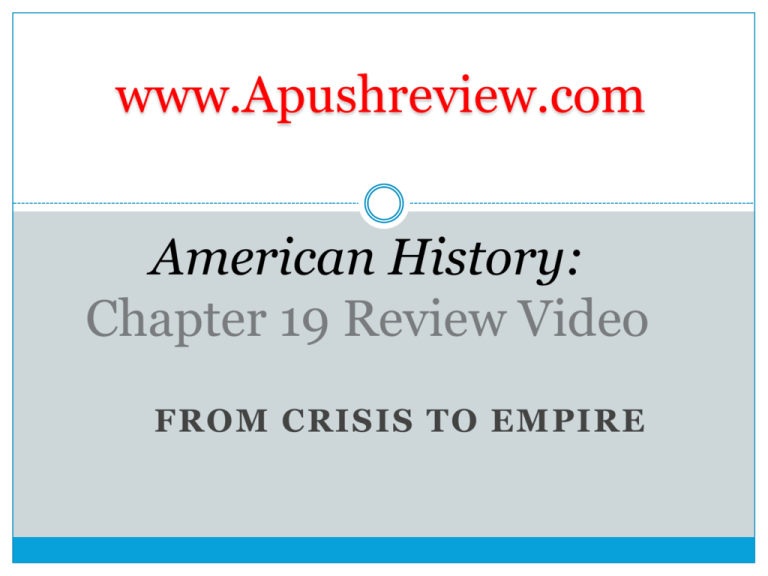
www.Apushreview.com American History: Chapter 19 Review Video FROM CRISIS TO EMPIRE The Politics of Equilibrium Big Ideas during the late 19th century: High voter turnout Control of Congress switched between parties frequently Republicans – northern Protestants, middle class, high tariffs Democrats – Catholics, immigrants, poorer workers, low tariffs How did the government support economic development? Subsidies to Railroads Military to end work stoppages Key terms to know: Stalwarts – Republicans that favored patronage Roscoe Conkling “Half-Breeds” – favored reform in government James Blaine The Politics of Equilibrium Cont. James A. Garfield 20th president; killed by a Stalwart Chester A. Arthur – Pendleton Act (1883) – Civil Service Exam Election of 1884: Cleveland v. Blaine Dirty campaigning – “Ma, ma, where’s my pa? Cleveland wins – laissez-faire president Tariff issue separated Republicans and Democrats Sherman Antitrust Act (1890) More symbolic than anything else Purpose was to break up trusts ***In actuality it was used to break up unions*** The Politics of Equilibrium Cont. McKinley Tariff (1890) – he was a Republican Republicans wanted to RAISE tariff rates Munn v. Illinois: (1877) State governments can regulate industries when in best interest of public Wabash Case: (1886) Yet again, states cannot regulate interstate commerce (overturned Munn decision) Interstate Commerce Act: Created ICC Outlawed higher rates on short hauls than long hauls RRs must publish their rates The Agrarian Revolt The Grange: Provided social and economic opportunities for FARMERS Sought to end monopolies in RR, wanted government ownership of businesses Populist Party Absorbed some ideas from farmers Omaha Platform (written by Ignatius Donnelly) Free and unlimited coinage of silver at ratio of 16:1 A graduated income-tax (redistribute wealth) Gov’t ownership of the telephone and telegraph, and railroads. Initiative, referendum and recall Postal savings banks (safe repository run by gov’t) Limiting gov’t land grants to settlers rather than railroads Direct election of senators The Crisis of the 1890s Panic of 1893 Causes: Who would have guessed it, overspeculation Stock-market crash, Overproduction Results: Gov’t repeals Sherman Silver Act Coxey’s Army: Advocated a public works program Marched a group of unemployed individuals to Washington Broken up by police Free Silver: Having silver back the value of the dollar at a ratio of 16:1 Would favor famers and debtors – easier to pay off debt A Cross of Gold William Jennings Bryan Won Democratic nomination in 1896; great orator Challenged McKinley Cross of Gold (Like Henry Clay, he ran for President three times and lost!) "We will answer their demands for a gold standard by saying to them: ‘You shall not press down upon the brow of labor this crown of thorns, you shall not crucify mankind upon a cross of gold.” Election of 1896: First “modern” campaign” Bryan advocated lowering the tariff (Democrats want the tariff to go DOWN!) Stirrings of Imperialism US sought expansion overseas – why? Manifest Destiny was complete Frontier “closed” ***Alfred T. Mahan*** - Influence of Sea Power Control of the sea was important to world dominance Urged the US and other countries to build their navies Favored by T. Roosevelt and other expansionists Why was Hawaii attractive to US? Sugar production Since 1840s, US had foreign interest in HI US wanted to annex HI 1890, tariff exemption on Hawaii ended, high prices on imports – hurt US farmers in Hawaii Queen Liliuokalani believed native Hawaiians should control the islands Queen was overthrown in 1893 after revolt by planters Treaty to annex HI was initially rejected by Grover Cleveland 1878 – US naval station in Samoa War With Spain In 1895, Cuba revolted against Spain, following a policy of scorched-earth US very concerned. Why? $50 million of investments, $100 million of annual trade Spanish General “Butcher” Weyler tried to crush rebellion Barbed-wire reconcentration camps Yellow Journalism: “You furnish the pictures and I’ll furnish the war” Spanish Minister spoke negatively about McKinley: Called him weak! De Lome letter War With Spain Continued USS Maine mysteriously blew up, killing 260 sailors USS Maine and subsequent pictures was a HUGE cause for US involvement in war (February 15, 1898) April 11, 1898 McKinley sends a message to Congress urging war with Spain Teller Amendment: Once US overthrew Spanish rule, Cubans would be given their freedom “Rough Riders” Group of volunteers that played a role in Spanish-American War in Cuba August 12, 1898 armistice was signed 400 Americans died during battle, 5,000 died due to disease War With Spain Continued What did America gain? Guam, Cuba, Puerto Rico Philippines Key issue of what to do. McKinley planned to “Christianize and civilize them” Anti-Imperialist League Mark Twain, Presidents of Harvard and Stanford, Samuel Gompers, and Carnegie Didn’t Filipinos deserve “Consent of the governed?” White Man’s Burden encouraged imperialism Foraker Act of 1900 Puerto Ricans granted limited degree of popular government Later granted US citizenship in 1917 – Jones Act The Republic As Empire Key question with new land: Does Constitution follow flag? Protect these people? Insular Cases Constitution does not apply to new areas. “Subjects may be subject to American rule, but they did not enjoy all American rights.” 1902, US withdraws from Cuba…. sort of Platt Amendment (Know this!!) Cuba can’t have treaties with other countries that compromises independence US can intervene to restore order Guantanamo Bay given to US Philippines thought they would receive independence like Cuba, not included in peace negotiations Emilio Aguinaldo wanted revenge Guerilla warfare Aguinaldo is captured The Republic As Empire Continued Europe established spheres of influence in China US fearful of missing out on markets Secretary of State John Hay established Open Door Note Purpose was to ensure US would not be locked out of China Secret Society of the Harmonious Fists “Death to Foreign Devils!!!!” Broken up by multinational troops Thanks for watching! Subscribe to my channel Help spread the word Questions? Comments? Ideas for videos? Leave in comments
